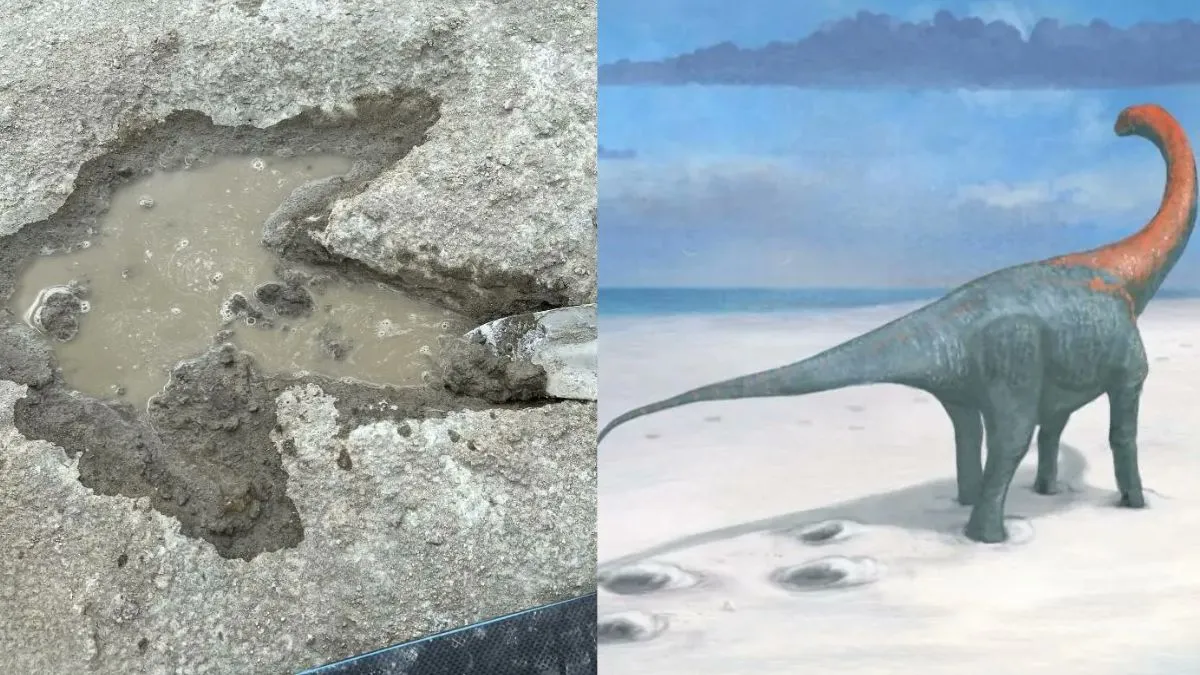- By Shivangi Sharma
- Wed, 15 Oct 2025 05:30 PM (IST)
- Source:JND
A shocking discovery in the UK's Oxfordshire has revealed one of the world's longest dinosaur trackways, in a rare insight into life 166 million years ago. Uncovering the Dewars Farm Quarry has revealed almost 200 dinosaur footprints that create a gigantic “dinosaur highway” that covers a whopping 220 metre stretch, making it one of the longest trackways ever recorded.
The footprints, which were labelled by Emma Nicholls of the University of Oxford’s Natural History Museum as “insanely big,” feature those of enormous herbivorous sauropods, likely Cetiosaurus, and the 9-metre-long carnivore Megalosaurus, the first dinosaur to be described scientifically in 1824. Some of the herbivores were twice the size of Megalosaurus itself, giving a glimpse of the sheer scale of the area's Jurassic-era fauna.
Classified Rock Sparkles Surprise Scientists
It was first discovered in 2023 by limestone quarryman Gary Johnson while he dug the stone for road construction. He immediately attracted the interest of palaeontologists keen to piece together the activities and movements of these gigantic giants.
Our palaeontologists worked with their counterparts from @UniofOxford to uncover a huge expanse of quarry floor filled with hundreds of different prehistoric footprints on Britain’s ‘dinosaur highway’ https://t.co/UIWhfbCV8y pic.twitter.com/HbbemtftqH
— UniBirmingham News (@news_ub) January 2, 2025
“This is like a glimpse into their day-to-day life and their patterns of movement,” explained Dr. Kirsty Edgar, a micropalaeontologist also working on the dig.
Accurate Excavation And 3D Record
The team in June 2024 spent a week documenting and excavating the site in detail, accompanied by approximately 100 volunteers and researchers from the Universities of Oxford and Birmingham. With the help of aerial drones, they took in excess of 20,000 photographs to create precise 3D models of the footprints, securing the find for further detail.
Analysis revealed the way the dinosaurs were travelling northeast around 5 kilometres per hour (3 mph), approximately the walking human's speed. Smaller theropods could possibly have accomplished a run, but the larger Megalosaurus progressed slowly, and its route intersected the sauropod prints, implying the hunter pursued the prey soon after.
The preservation of the site is superb. The gentle sediment, presumably by a shore face with mud banks and nearby water, enabled the impressions to be defined nicely. Dr. Edgar likened the ancient world to the modern-day Florida Keys. A rapid storm very likely buried the prints, sheltering them from the million-year erosions.
Developing Upon Preceding Findings
This discovery follows a previous trackway discovered in 1997 at the same quarry but no longer accessible. This new find further informs the understanding of Jurassic ecosystems in the UK and provides key insights into the behaviour, locomotion, and interaction of the dinosaurs.
Future Prospects As excavation continues, researchers hope the Dewars Farm Quarry dinosaur highway will help scientists better understand the prehistoric landscape of Oxfordshire, revealing the lives of these giant creatures that once dominated the Earth.

